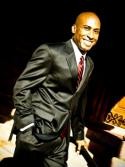The Relational Economy: Investing - Part 4
- Hudson Russell Davis Crosswalk.com Contributing Writer
- Updated Aug 25, 2010

We must realize that the relational economy is not there for our benefit alone. If you do not realize this, you are shortsighted. Indeed, you are probably already doing damage. Whether dating or marrying, imitating God means that we purpose to see the other person profit. The hope is that, being in Christ, their purpose is to see you profit. In which case all prosper.
Remember that we are to consider others "better" than ourselves (Philippians 2:3).
We build into other people FIRST because they are precious to God.
We love others first because God loves them and because we see in them to love of God.
It is this love of God we all seek, no matter the list we have made.
It is "Christ in [us], the hope of glory" that is most attractive (Colossians 1:27).
He has commanded us to love one another; to invest in such a way that Christ is made known. After the tattered way our hearts have come through the relational economy it is no wonder He gives us the example of Gomer. If not for Gomer, we might just wonder whether there was a limit to God's love and grace.
From that man Hosea and that woman Gomer we see a picture of how "God's grace and the gift that came by the grace of the one man, Jesus Christ, overflow[s] (Romans 5:15). And what we see in the one example of Gomer we understand to extend "to the many" who believe (Rom. 5:15)!
All that said, I don't suspect Hosea was sitting around thinking, "Who should I marry? What about, let's see, Gomer!" No! Hosea was probably sitting around thinking, as a godly man should, about godly women. It is seeing things from God's point of view that brings Gomer to our attention. In the same way, now that Christ has come, we see no one as before.
Gomer was a woman trapped in prostitution. Whatever the circumstances that drove her to such a life, she took what was priceless (her own person) and sold it to those who would pay. Even today, men and women who give themselves too freely outside of marriage are trapped both in mind and body. They may not think of it this way but the Bible tells us that the "the god of this age has blinded the minds of unbelievers, so that they cannot see the light of the gospel of the glory of Christ, who is the image of God (2 Corinthians 4:4).
The problem is that coming out of our blindness to salvation we often see as the blind man who Jesus healed in Mark 8:24. "He looked up and said, "I see people; they look like trees walking around." Even the redeemed sometimes live lives of poverty. While the power of the Spirit can transform us instantly, He often works for years until our sight is fully "restored, and [we see] everything clearly" (Mark 8:25).
Some who are in Christ still follow the old way, but praise God we are all being "transformed by the renewing of our minds" (Romans 12:2).
We are not there yet. Some whose lives have been less than perfect can testify to the wasting they felt or still feel; a wasting that is both physical and spiritual. Armed with this knowledge, empowered by the Spirit of God, we must treat each other in a way that brings God's redeeming love to lives wasted and squandered in the world's economy.
We must be Hosea to Gomer and love as God loves.
It is not possible to relate in the old way—with ruthlessness and self-indulgence—while living as Scripture commands. According to Scripture, people are to be objects of our love where our love is shaped and curtailed by God's love. There should be no confusion. Our mission in all facets of the relational economy is to "Love one another" as Christ has loved us (John 13:34).
We know that the world will know we are Christians by the way we "love one another" (John 13:35). It is not possible to proceed with ruthless determinism if we "love one another deeply, from the heart" as Peter commands us (1 Peter 1:22). Love one another is the resounding message offered by the apostle John (1 John 3:11, 1 John 3:23, 1 John 4:7, 1 John 4:11, 1 John 4:12; 2 John 1:5). Loving one another is at the heart of the Gospel.
We have found the Kingdom of God to be as a treasure hidden in a field, and we have sold all we had. It is now a matter of spending our treasure wisely.
Seek to be a blessing even while you seek to be blessed. Make it a goal to be able to say, even of the relationships that are short-lived, that you blessed that person even as you sought and expected blessing. You should invest in such a way that the other person is blessed through you and left better off for having known you.
The hope is always that if a dating relationship does not end in marriage each person is still richer for the experience not stripped of worth and crushed in spirit. If it ends in marriage, the foundation and pattern for increased wealth and worth will have been laid. If you learn to care for hearts as a single person, it WILL transfer into marriage. If your dating is opportunistic and selfish, expect more of the same in marriage.
To us is given the gift of the Holy Spirit. We must have in mind, then, that God has endowed each person we meet with the Holy Spirit. We encounter saints every day. The dating process is not different. The world of dating would perhaps be a whole lot more charitable if it was conducted with this thought in mind. Or perhaps we could keep in mind that "whatever [we] do, whether in word or deed, [we] do it all in the name of the Lord Jesus, giving thanks to God the Father through him" (Colossians 3:17).
In other words, you need to be able to give thanks to God the Father for the way you have treated that other person. Whatever comes of the relationship you should be able to say that you honored that person "in the name of the Lord Jesus." Love them like Hosea loved Gomer—as God loves us.
Got feedback? Send your comments and questions to Hudson at hudsondavis@streamsinthewilderness.com. If you don't hear back within a few days' time, please try again. Hudson would like to respond to all reader feedback.
Or become a fan of "Streams in the Wilderness" on Facebook here: Streams In The Wilderness
**This article first published on August 17, 2010.




















